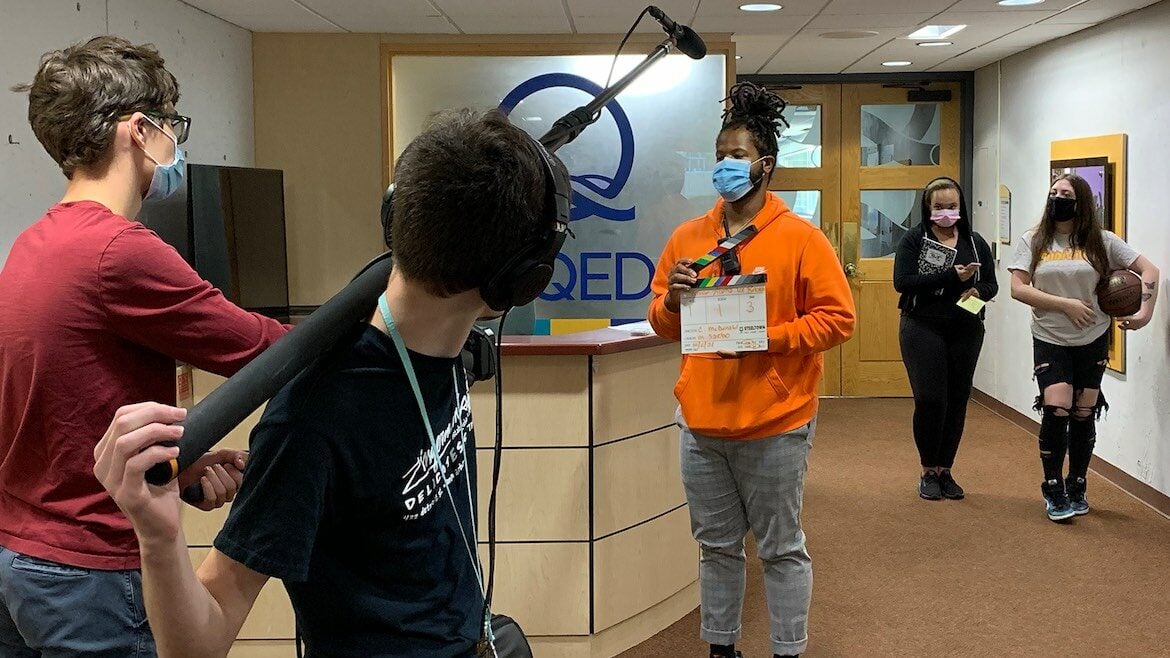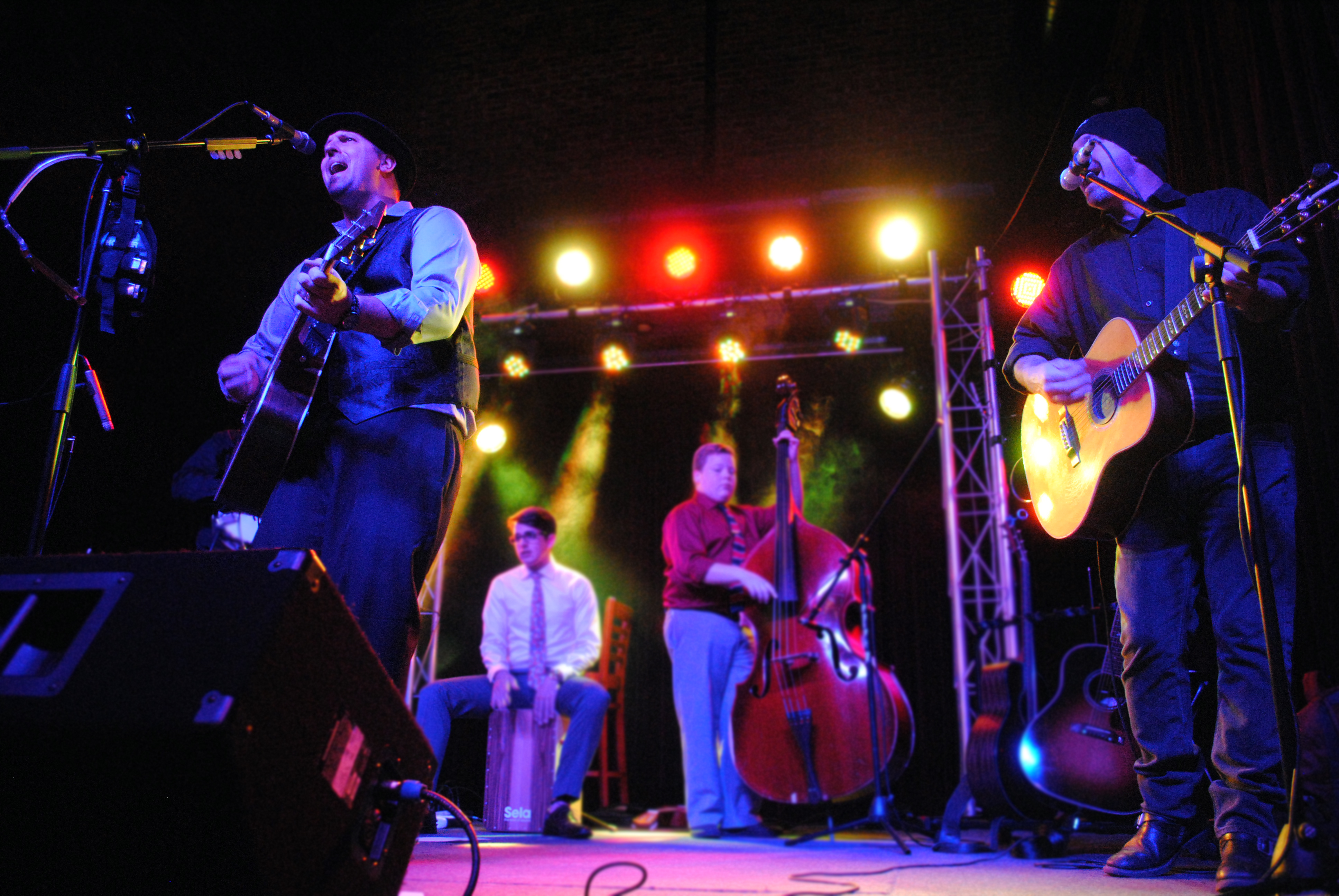Commissioners’ statements on WQED second station decision, 1999
text of the order, Dec. 15, 1999.William Kennard and Gloria Tristani (Democrats)
Michael Powell and Harold Furchtgott-Roth (Republicans)
Susan Ness (Democrat)
Statement of Chairman William Kennard and Commissioner Gloria Tristani, dissenting in part
We disagree with the majority’s decision not to designate Cornerstone’s application for hearing. Under Section 73.621 of our rules, an applicant for a reserved channel must demonstrate that the station “will be used primarily to serve the educational needs of the community.” If there is any substantial and material question of fact on that issue, the Commission must designate the application for hearing on the issue of whether the applicant’s proposed programming is primarily educational. Here, even according all due deference under our precedent, the applicant has failed to carry its burden of proof. There are simply too many unresolved questions of fact regarding whether the proposed programming is primarily educational, or primarily something else.
Nor do we believe that the Commission’s current standard is too vague to be applied to this applicant. The Commission established the general rule that reserved channels must be used primarily to serve the educational needs of the community and left the assessment of whether the standard has been met to case-by-case review. There is nothing unusual or improper about this. To the contrary, it is well-settled that “the decision whether to proceed by rulemaking or adjudication lies within the broad discretion of the agency.” In any event, even assuming that our standards needed to be clarified, the right solution would have been to give the administrative law judge further guidance, not to give this applicant a free pass. The people of Pittsburgh — who are counting on the Commission to preserve the integrity of channels reserved for educational use — deserve no less.
Instead, the majority has decided to grant the application. Standing alone, the majority’s decision to grant this application would eliminate all eligibility standards for the reserved band.
To avoid this result, we join in that part of the order which sets forth clarified programming standards for broadcasters using reserved noncommercial channels. All broadcasters, including Cornerstone, are subject to this standard, which provides, among other things, that programming primarily devoted to religious exhortation (e.g., preaching), proselytizing, or statements of personally-held religious views and beliefs generally will not qualify as educational programming. While we regret the Commission’s decision not to apply this standard to the facts before us, we believe that today’s decision will permit the Commission to more effectively and expeditiously enforce its rules in future cases involving any broadcasters, including Cornerstone, alleged to be in violation of those rules.
Separate Statement of Commissioners Michael Powell and Harold Furchtgott-Roth approving in part and dissenting in part
Re: In Re Applications of WQED Pittsburgh and Cornerstone Television, Inc. (file number BALET-970602IA), et al.
Although we support most aspects of this order, we dissent from the portion of the decision that purports to give “additional guidance” to licensees using frequencies in reserved band to provide noncommercial television service. This guidance is, in fact, a significant departure from well-established Commission practice. As explained below, we object to its inclusion in this order on both procedural and policy grounds. This guidance may open a Pandora’s Box of problems that will create confusion and litigation that noncommercial licensees can ill afford.
The guidance announced in this order does three significant things. First, it quantifies the obligation of noncommercial licensees to “primarily serve the educational needs of the community” by requiring that “more than half of the hours of programming aired on a reserve channel must primarily serve an educational, instructional or cultural purpose in the station’s community of license.” Order § 43. Second, it concludes that “a program must have as its primary purpose service to the educational, instructional or cultural needs of the community” in order to count toward this new benchmark. Id. Third, it singles out religious programming and purports to draw a line between programming that teaches about religion which would count toward the new benchmark and programming “devoted to religious exhortation, proselytizing, or statements of personally-held religious views and beliefs” which would not generally qualify. Order § 44.
Initially, as a procedural matter, we object to this guidance because it makes a substantial change in the Commission policy toward noncommercial licensees without the benefit of input from the broad class of affected licensees. While it may be legal for the Commission to make policy statements in an adjudicatory proceeding, we do not believe that it is wise to make a broad change like this without considering the views of a wider cross-section of those affected, particularly where constitutional questions are implicated.
On a substantive level, quantification of the “educational” obligation of noncommercial licensees suggests a greater federal intrusion into the programming judgment of noncommercial licensees that is, to our thinking, unwarranted and may well be unconstitutional. Nothing in this record suggests a general problem among noncommercial licensees that requires either quantification or more stringent definition of what is “educational” programming for the reserved bands. Although it might, in a theoretical sense, be desirable to define qualifying programming, one must realistically evaluate the difficulty of that task and fully consider the potential restraint it may impose on noncommercial licensees.
It is true that judging what programming will serve the “educational, instructional and cultural needs” of a given community necessarily is a subjective determination. In the past, the Commission has wisely left this determination almost entirely to the noncommercial licensee who is closest to the community, subject to government reversal only if that judgement is arbitrary or unreasonable, a determination necessarily dependent upon the facts of a specific case. To the extent that the guidance in this order suggests that instead of trusting the judgment of licensees, the Commission now will take a more active role in evaluating licensee programming decisions, we think it turns in the wrong direction. Such guidance invites unnecessary battles over the content of noncommercial programming.
Quite simply, the more the Commission attempts to generically define which “educational, instructional and cultural” programming will count for regulatory purposes, the closer it will come to unacceptable content regulation. The example of church services used in this order illustrates the point. The order indicates that church services generally would not qualify as “general educational” programming. Order § 44 n.91. We ask however, why such programming might not qualify as “cultural” programming just as a presentation of an opera might? It would be very hard to broad brush either type of programming as having no intrinsic cultural value. Moreover, depending upon the nature and content of the service, it might very well be properly educational. Certainly, millions of Americans attend church services, in part, for the educational value of the teachings embodied in a sermon. Additionally, we are concerned that any attempt to make a distinction based on religion alone raises grave constitutional concerns. We therefore object to any distinction made on these grounds and we fail to see any other distinction that withstands scrutiny.
We further object to the suggestion in this order that qualifying programming must appeal to the broader community. The hallmark of noncommercial television has been service to the needs of smaller audiences. Indeed, the Commission regularly emphasizes the value of diverse niche programming to serve underserved and underrepresented populations. Thus, we see no basis for disqualifying a program simply because it appeals to only a segment of the population.
In sum, we cannot support the additional guidance portion of this order. While clarity in regulation may be a noble goal as a general matter, when treading this close to content regulation, we believe the traditional deference the Commission has given to broadcasters, murky though it may be, is the better course.
Separate Statement of Commissioner Susan Ness
Re: Applications of WQED Pittsburgh and Cornerstone Television, Inc., For Consent to the Assignment of License of Noncommercial Educational Station WQEX(TV), Channel *16, Pittsburgh, Pennsylvania
In considering the application of Cornerstone Television, Inc. (“Cornerstone”), to acquire the license to operate a Noncommercial Educational Television (“NCETV”) Station on Channel *16 in Pittsburgh, Pennsylvania, we face the difficult task of balancing two cardinal principles at the heart of our regulation of public broadcasting: First, we seek to safeguard the reserved allocations for NCETV stations an oasis for “the important contributions which noncommercial educational television can make in educating people both in school at all levels and also the adult public.” Second, we seek to respect the First Amendment rights of broadcasters, including broadcasters of programming with a religious orientation, to exercise their editorial discretion.
Ultimately, I concur in granting Cornerstone’s application. After applying our existing rules and precedent to the record in this proceeding, I cannot conclude that there is a substantial and material question of fact concerning the reasonableness of the applicant’s judgment that its proposed programming will be “used primarily” to serve the “educational” needs of the station’s community. My decision is based upon the application of our current overly general guidelines to Cornerstone’s program showing and Cornerstone’s apparent willingness to modify its programming to comply with the requirements of Section 73.621, which should include any clarification we provide.
Given the consequence of this decision, I write separately to explain why I cannot hold the applicant’s judgment to be “arbitrary or unreasonable.” As the recitation of our precedent in the decision we release today makes clear, “as in all matters relating to programming, we will defer to the judgment of the broadcaster unless [that] categorization appears to be arbitrary or unreasonable.” Notice of Inquiry, Docket No. 78-164, 43 Fed. Reg. 30847, 30845 (1978) (“Guidelines”). We also have clearly stated that “some programs will properly be considered to be both instructional and religious or both general educational and religious.” Id. But as to what constitutes a “general educational” program, our processing guidelines only state that a “general educational” program is “an educational program for which no formal credit is given.” Id. at 30844-45. Cornerstone’s Programming Showing Under Current Guidelines And Precedent
In the absence of clearer definitions and guidance, I am concerned that finding this broadcaster’s judgment to be arbitrary or unreasonable would constitute an improvident review of the applicant’s judgment, especially prior to any actual broadcast by Cornerstone of programs on the reserved channel. In its final amended showing, filed in April of this year, Cornerstone made a significant effort to demonstrate that approximately 100 hours of its current and proposed programs can be reasonably categorized, in its judgment, as “general educational” programs. Some of these programs are clearly educational, even given the very general definitions and guidelines that we have provided, while the assessment of other programs becomes more problematic. See Decision, § 41 & n.46. Looking at the record as a whole, in light of our current precedent, I cannot say that the Commission can establish a basis for delineating a “substantial and material question of fact” concerning the applicant’s judgment, much less find that judgment to be “arbitrary or unreasonable.”
My conclusion is based in significant part on the absence of clarity in our definition of “general educational” programming and our guidelines for determining what is “religious” but not “educational” pursuant to Section 73.621. We have not previously given applicants sufficient guidance as to how we will assess the reasonableness of their judgment, so that absent the most abusive exercises of broadcaster discretion, our own judgment must be circumspect. As the Supreme Court has recognized for almost 50 years, the “lack of standards in the license-issuing ‘practice’ renders that ‘practice’ a prior restraint in contravention of” the First Amendment. What Justice Frankfurter wrote in his concurring opinion in Neimotko nearly 50 years ago concerning the issuance of permits governing the right to hold meetings in public parks cannot be ignored by this Commission — “the basis which guides licensing officials in granting or denying a permit must not give them a free hand, or a hand effectively free . . . .” Neimotko, 340 U.S. at 284-85 (Frankfurter, J., concurring). In this case, given the most general guidance provided for our review of the applicant’s programming judgment, I cannot find “arbitrary or unreasonable” the applicant’s judgment that its proposed programming will be “used primarily to serve the educational needs” of the Pittsburgh community.
Additional Guidance
Nevertheless, having concluded that our guidelines currently are sufficiently vague to make me reluctant to disregard the broadcaster’s judgment concerning its programming, I have joined two of my fellow Commissioners to clarify the guidelines for our review of NCETV proposals and programming. We have an obligation to provide additional guidance to FCC staff, as well as to applicants and existing licensees, if we are to be able to assess whether a broadcaster’s judgment is reasonable.
I recognize that it is a difficult task to establish meaningful and valid guidelines, and that the guidance proffered in our decision will not clarify the categorization of every program, given the variety of programs that can be broadcast. It is axiomatic, however, that the reservation of allocations for noncommercial educational stations is more than simply a reservation for noncommercial stations. Without adequate guidance, we effectively would eliminate the eligibility standards that preserve the “educational” mission of the reserved allocations.
We now clarify our guidelines to state that for an NCETV station to be “used primarily to serve the educational needs of the community,” more than half of the hours of programming aired on that station must primarily serve an educational, instructional or cultural purpose. Decision, § 43. Moreover, in order to qualify as a “general educational” program, a program must have as its primary purpose service to the educational, instructional or cultural needs of the community. Id. While some programs will properly be considered to be both general educational and religious, a program primarily devoted to religious exhortation, proselytizing or testimonials regarding personal religious faith generally will not qualify as a “general educational” program.
Given this additional guidance, we will continue to defer to the judgment of an applicant or licensee concerning the educational nature of its programming, unless that judgment is arbitrary or unreasonable. We also understand that the overall context of the broadcast is important to evaluating the reasonableness of the judgment of the broadcaster. While there may be additional guidance concerning the types of programming that would or would not qualify under Section 73.621(a), I do not believe that it would be appropriate to go beyond our elaboration today, absent public discussion and comment.
While we have the legal authority to do so, I also believe that it would be inequitable to apply our newly enumerated processing guidelines to judge the instant record, which was developed over more than two years without the benefit of such clarification. First, the fact that this Commission has never issued more than very general guidelines suggests that our new guidance, which may be viewed as significant, should be carefully applied. Applying the revised processing guidelines to a record developed without its benefit would not constitute a wise exercise of discretion. Second, the potential harm to Cornerstone and others from our application of new definitions and guidelines is significant. Cornerstone and other parties would face, at a minimum, additional delay in any action on their pending applications. Moreover, a Commission action that questions Cornerstone’s judgment regarding its own programming showing based upon clarified processing guidelines delineated after the submission of Cornerstone’s showing raises issues of fundamental fairness. Finally, the grant of Cornerstone’s application should not create deleterious mischief to our rules for reserved NCETV channels. As even Cornerstone recognizes, it is obligated to comply with Section 73.621, and it will be obligated to comply with any clarifications to Section 73.621(a), including those that are evident from this decision. As noted in our Decision, if Cornerstone’s operation of an NCETV station is shown to violate Section 73.621, as clarified by our decision, after programming is actually broadcast on Channel *16 by Cornerstone, the Commission can take appropriate action at that time. Conclusion
By our decision today, we tread carefully to further our two cherished objectives preserving the distinct public benefits of the reserved educational allotments and respecting the First Amendment programming deference broadcasters enjoy when seeking to operate on such frequencies. I expect that Cornerstone will honor its commitment to meet the requirements — as clarified today — for broadcasters operating on reserved channels. In turn, the Pittsburgh community will soon again be served by two distinct educational television stations.






